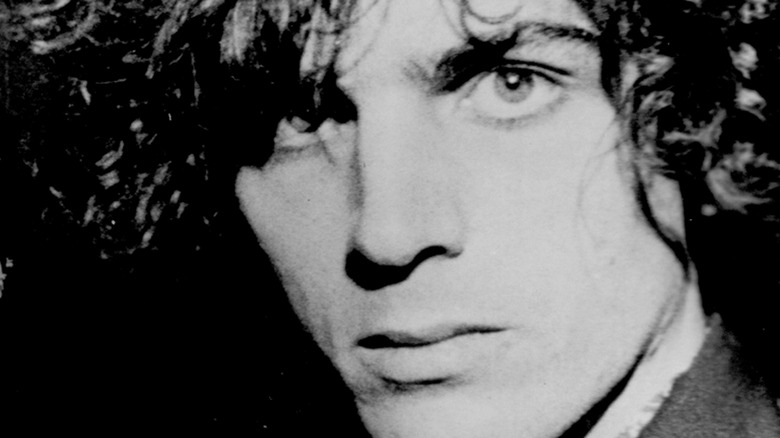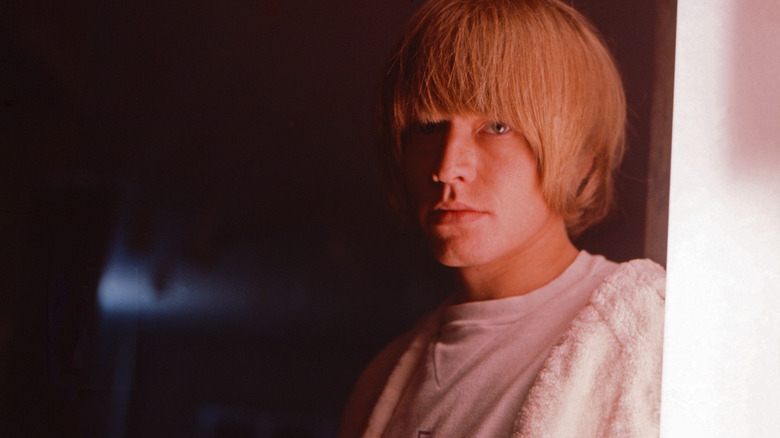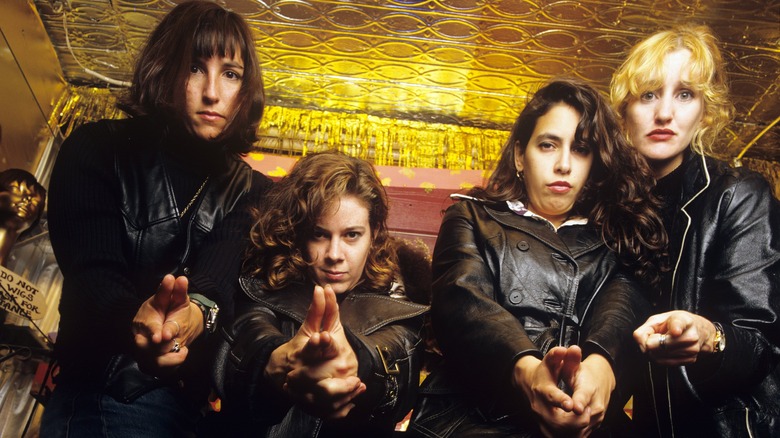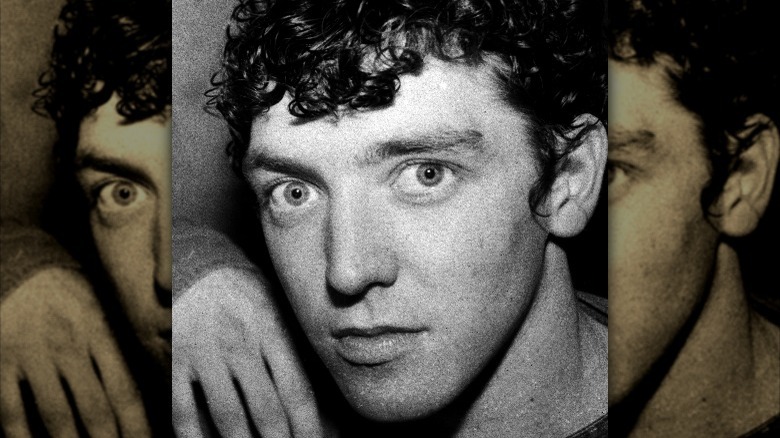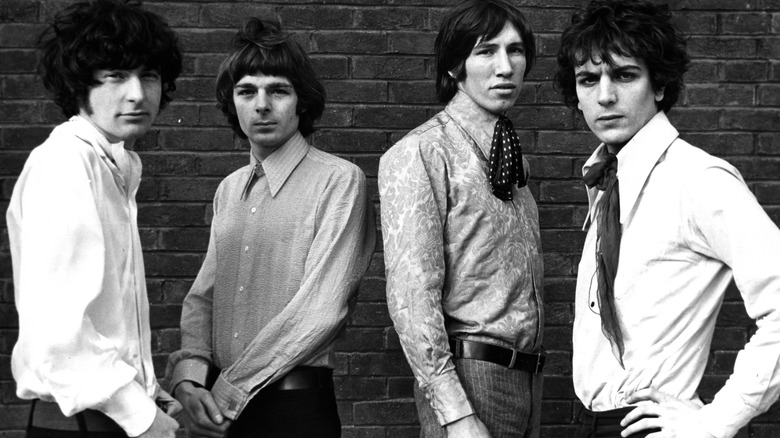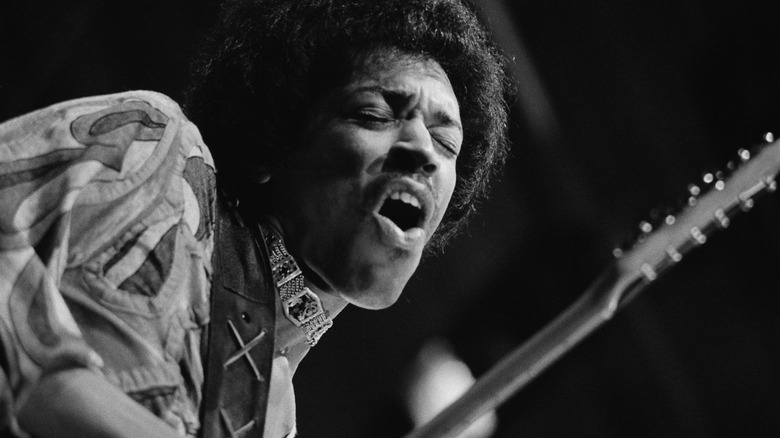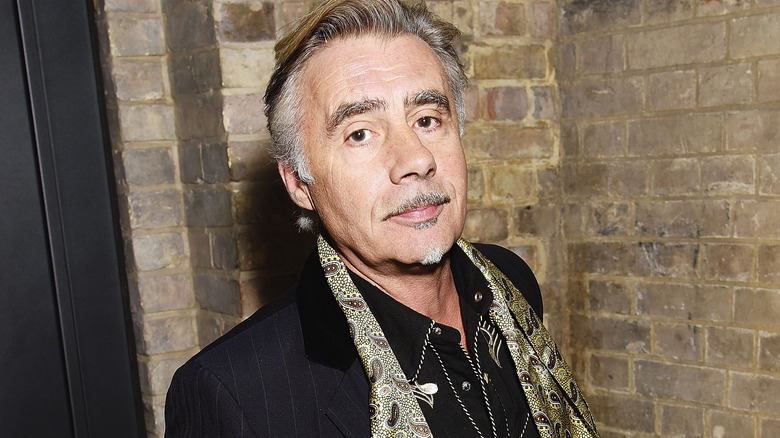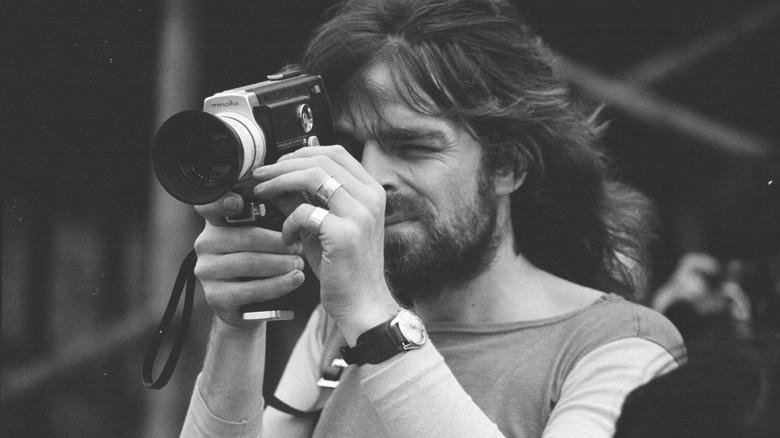Musicians Who Got Fired From The Band For Sad Reasons
Hearing about the breakup of a beloved band can be devastating — it's music that gets people through the good times and the bad, after all, and that's a powerful thing. In some cases, a line-up change can be just as bad. And here's the thing: The reasons for sending someone on their way can be absolutely heartbreaking.
It's easy to think that musicians are on top of the world: They seem to have it all, from fame all the way to fortune. But there are other things that come with the life of a rock star, too: stress, grueling tour schedules, the pressure to make the next album better than the last, and the sneaking suspicion that the only reason anyone likes you is your star status. That can take a toll even on the people who want it the most, and sometimes, the fallout is devastating. Sometimes, bands are left with no choice but to part ways with members. It happens a lot — so, let's talk about some of the music industry's biggest and brightest musicians who got handed their walking papers for some incredibly sad reasons.
Brian Jones
Brian Jones died in 1969, about a month after he was fired from the band he helped start: the Rolling Stones. The circumstances are a bit mysterious, with Rolling Stone reporting that it was a mutual thing: Jones left the Rolling Stones in order to have full control over his music.
But that wasn't quite the case. Over the years, more came out about the parting of ways that was actually a firing: In various documentaries and biographies, the Stones said that while they definitely all took drugs, Jones was relying on them to the point where the rest of the band felt they couldn't count on him at all. He seemed to check out, and when arrests put restrictions on the traveling he could do, the other Stones headed to his home and told him his services would no longer be needed.
Years later, Mick Jagger would talk to the BBC about what had been at the root of his problems: "Fame doesn't sit very comfortably on anyone's shoulders. But some people's shoulders, it doesn't seem to sit on at all, and he was one of them." Even Keith Richards spoke to Jones's struggles, saying that as time went on, he started to change. "Someone you didn't suspect lurked in there... he became more self-destructive. I'm one to talk about that, right? But I'm still here, and Brian went for it all the way, and once he was down that path, there's no stopping."
If you or anyone you know needs help with addiction issues, help is available. Visit the Substance Abuse and Mental Health Services Administration website or contact SAMHSA's National Helpline at 1-800-662-HELP (4357).
Jon Anderson
Yes founder Jon Anderson told Rolling Stone that he didn't even know he had been replaced with a singer from a Yes tribute band: "They didn't tell me anything. They were just off and running. But what can you do?" Anderson said, adding that a friend eventually told him that he'd been fired. But, why?
It was 2008. He'd been the band's frontman for 40 years, and he was sick. In an interview with Rock History Music, he went into more detail about what ailed him. Anderson said that the oily smoke from the stage lights had caused him to start coughing up black mucus, and it took such a toll on him that he pitched the idea of putting together an acoustic album instead of continuing on tour. Anderson said that when he asked for a break to recover, he was dropped from the band he'd founded. "I was coughing so much that the only time I wasn't coughing was onstage. I just needed a break, but the guys were upset about that." The firing "broke my heart," he said. "People get into that place where they don't care about people. To them, it's just business."
Anderson said that it wasn't business for him, and while he was still upset about it, he knew he had to hit the reset. So, after leaving Yes, Anderson opted to tour at a more relaxed pace, alongside his wife. "It was the most precious fun I've ever had," he said.
Les McKeown
There was a time when the Bay City Rollers had the potential to be the biggest thing of their era. While the Beatles kicked off Beatlemania, the Bay City Rollers had Rollermania — but according to The Guardian, their star burned bright, hot, and fast. When they tried to track down the band in 2005, it took a ton of work to get an interview with Les McKeown. They quickly found out that decades after McKeown left the Bay City Rollers, he was still bitter.
On the surface, the band fired McKeown when he voiced the opinion that he didn't want to do a TV show. The increasing popularity of punk meant that groups like the Bay City Rollers needed to get with the times or fall by the wayside, and McKeown admitted that he was more interested in a drug-filled lifestyle than the survival of the band. But behind the scenes, he was dealing with some heavy stuff: In 1975, McKeown was behind the wheel of a Mustang when he hit and killed an elderly neighbor. Those who knew him say it devastated him, and even he said, "There's elements of what happened then that have something to do with the head trips today."
In 1978, McKeown was trying to get the royalties he was owed, which at the time were around $2 million... give or take. Fast forward to 2005, and he still hadn't seen the money. In 2021, his family announced his death via Twitter.
Kate Schellenbach
Kate Schellenbach (left) hit the New York City scene when she was still young and ended up as one of the founding members of a group that would become famous as the Beastie Boys. They were called The Young Aborigines in those early days, and the Beastie Boys grew out of that.
Schellenbach, though, wasn't allowed to ride the tidal wave of popularity that the band found themselves on, and as their sound became less punk and more rap, she was booted from the group. Adam Horovitz explained what had happened when he and Mike D sat down with PBS NewsHour, and although they had nothing but good things to say about her, they also said that at the time, there was becoming more of a focus on both the "Beastie" and the "Boys" part of their image. They sort of assumed that she probably wouldn't have been interested in being in the band anymore anyway... right? So, they fired her for the simple reason that she was a girl.
Both spoke to fame turning them into people they didn't like or recognize, and Horovitz explained, "We started becoming these dudes... we were gross. I don't know how else to say it. We kicked Kate out of the band because she didn't fit in with this new dude thing that we were doing." Since then, fences have been mended, and the Beastie Boys have collaborated with Schellenbach and Luscious Jackson.
Jason Everman
Grunge music of the 1990s wasn't precisely known for an upbeat and happy-go-lucky feel, and that's what makes it so weird that one musician — guitarist Jason Everman — got kicked out of Nirvana and Soundgarden for being a bit too much of a bummer.
The first was Nirvana, which he'd joined after a childhood friend recommended him. It seemed like a great fit: Everman paid off the debt they'd built up around the recording of their first record, and it seemed like everything was going fine. Until that is, it wasn't. Nirvana headed out on tour and Krist Novoselic said (via The New York Times), "We had some great shows with Jason, but then things went south really fast." Cobain was quoted as calling him a "moody metalhead," and Everman — who says he never knew the whole story — was out.
But at first, that was all right. He was almost immediately picked up by Soundgarden, went on tour with them, and was completely convinced that he'd found the place he was going to be for the rest of his life. Then, he was blindsided by a band meeting that was called to fire him. Why? Chris Cornell told him that it just wasn't working. Both bands went on to be huge, and Everman said, "It was a huge blow. I had no warning." Everman, fortunately, picked himself up and did find his calling: He met with Army recruiters and ended up in the Special Forces.
Tony McCarroll
There are two sides to every story, especially when it comes to the relationship between temperamental artistic types. And speaking of temperamental artistic types, there's temperamental, and then there's Oasis. Brothers Noel and Liam Gallagher famously turned confrontation into an art form, so it's perhaps not entirely surprising that they sacked someone from the band after their monumental first album.
That was drummer and founding member Tony McCarroll, and there are two very different stories about what happened. On one hand, the Gallaghers say that he was just a pretty bad drummer... although it's worth noting that many say Oasis was a much better band with him. On the other hand, McCarroll said he left Oasis because Noel Gallagher didn't appreciate having a band member who wasn't an unconditional yes-man.
And it ended really, really badly: McCarroll had known the Gallagher brothers from childhood, and in spite of the fact that Oasis predated the Gallaghers, they didn't even tell McCarroll they fired him. He says he was simply no longer included anymore, and attempts at finding out what had happened were fruitless. McCarroll eventually sued for his portion of the royalties, and the case was settled for an undisclosed amount in 1999. As he walked out of the courtroom, The Guardian reported that when asked how he felt about the remaining members of Oasis, he simply replied, "I no longer have anything to do with them."
Danny Kirwan
Danny Kirwan was just 18 years old when he joined Fleetwood Mac, and he played on a series of albums before he was fired during the middle of 1972's Bare Trees tour. According to Rolling Stone, the band cited increasingly erratic behavior stemming from problems with alcohol as the reason for giving him the boot.
What happened to Kirwan after leaving the band suggests that there was much more going on with him than perhaps the other members of the band even realized. In 1993, Mick Fleetwood realized that no one had seen or heard from him in a long time, and actually contacted the UK's Missing Person Bureau. After they found Kirwan, he sat down for an interview with the Independent, saying that since he had left the band, he had been homeless, squatting in a Brixton basement, or living in a hostel for much of the time: And that means that ultimately, a lot of his struggles were a private matter.
He told them, "I was lucky to have played for the band at all. ... but I couldn't handle the lifestyle and the women and the traveling." When he passed away in 2018, his obituary cited lifelong struggles with mental health issues. He was not present when he was inducted into the Rock and Roll Hall of Fame with the rest of Fleetwood Mac.
If you or someone you know needs help with mental health, please contact the Crisis Text Line by texting HOME to 741741, call the National Alliance on Mental Illness helpline at 1-800-950-NAMI (6264), or visit the National Institute of Mental Health website.
Syd Barrett
The reason Syd Barrett left Pink Floyd is downright heartbreaking, and it was David Gilmour who explained what happened to MOJO. One day, they had been on their way to a show, and "someone said, 'Shall we go and pick up Syd?' And someone else, probably Roger, said, 'Naaah, let's not.' And we didn't, and we drove off to Southampton."
And so ended Syd Barrett's connection with the band that he started. Gilmour further explained, "He wasn't capable or willing to do what was needed and when you're young and ambitious you're also pretty callous, and we just got on with it."
But what, exactly, does that mean? Barrett's increasingly regular LSD use had made him increasingly unpredictable. At the same time, he was writing songs that sent Pink Floyd's popularity skyrocketing; he was occasionally catatonic; and he occasionally couldn't recognize his bandmates. There may have been more to it, and it's now believed that Barrett could have been diagnosed with either bipolar disorder or schizophrenia. When Rolling Stone caught up with him in 1971, he was still writing and painting, but he was also living in a Cambridge basement and apologizing to the interviewer: "I'm disappearing, avoiding most things. ... I'm treading the backward path. ... I'm sorry I can't speak very coherently. ... I don't think I'm easy to talk about. I've got a very irregular head. And I'm not anything that you think I am anyway." Barrett died in 2006.
If you or someone you know needs help with mental health, please contact the Crisis Text Line by texting HOME to 741741, call the National Alliance on Mental Illness helpline at 1-800-950-NAMI (6264), or visit the National Institute of Mental Health website.
Jimi Hendrix
If there's anyone who seems like they were born to be on stage, it's Jimi Hendrix. That wasn't always the case, though. Back when he was still known as Maurice James, Hendrix was fired by Little Richard for his complete inability to live up to the legend's expectations.
There are a few stories that are told about Hendrix getting fired from his band. In spite of the fact that he was so clearly gifted, he reportedly struggled with the day-to-day of touring — and according to those who saw him working alongside Little Richard, he wasn't all too happy about the rules and regulations put in place. He viewed schedules and timetables as optional, and that was a massive problem.
While there are a number of stories about just what happened when Hendrix was fired, Robert Penniman (Little Richard's brother ) made it clear that he definitely knew the real story of what happened — he'd been the one to fire him. Penniman said that Hendrix had been on thin ice for a long time, but when he was so late that he missed getting on a tour bus and was left behind in New York City, it was decided that enough was enough. He explained in "The Life and Times of Little Richard" that, "He was a damn good guitar player, but the guy was never on time. He was always late for the bus and flirting with the girls and stuff like that."
Glen Matlock
It's safe to say that audiences pretty much know what they're going to get with a band called the Sex Pistols, but that doesn't make the stories behind the group any less surprising — particularly the story of the firing of Glen Matlock.
When Matlock sat down to chat with Big Issue, they recapped the old story: He was fired because he was a massive fan of the Beatles. And Matlock confirmed that yes, the Beatles were one of the major influences that led to the idea of forming his own band. But, did his love of the Beatles spell the end of his involvement in his own band? Not exactly. In an interview with Songfacts, Matlock said, "That's not true — that's something Malcolm MacLaren said."
Steve Jones gives another version of the story in an interview with Rhino, saying, "[Matlock] was a good writer but he didn't look like a Sex Pistol, and he was always washing his feet. His mum didn't like the songs." Was that a good enough reason to oust someone from their own band? There may have been slightly more to it, and in his biography, "Lonely Boy: Tales from a Sex Pistol," Jones writes (via The Cinemaholic) that problems took root when it became clear that Matlock and Johnny Rotten didn't see eye-to-eye. Then, when Matlock started asking questions about the band's finances, he was shown the door.
Chad Taylor
Chad Taylor was one of the founding members of Live, and it's not entirely clear exactly what caused lead singer Ed Kowalczyk to post on Instagram, "As of last evening, I own 55% of Live. Chad Taylor is fired. He will never stop the music again."
Rolling Stone reported that whatever happened was slow to unfold, and things were made even more complicated by the fact that everyone seemed to have a different story. In a nutshell, Chad Gracey claimed Taylor brought things on himself by being "a raving, pathological narcissist," while Taylor lays the blame squarely on the shoulders of his business partner, Bill Hynes. He accused Hynes — who has a criminal record for stalking and assault — of stealing somewhere around $10 million from the band. Taylor called him a con man of the worst kind, explaining, "I was a sucker. I have people that depend on me, and I trusted a person that hurt us. I failed as a husband. I failed as a father. I failed the families of my bandmates. I have yet to forgive myself."
Live's public meltdown included the firing of Gracey and Patrick Dahlheimer, too. That was in 2022, but things hadn't been well behind the scenes for a long time. Band members were reported to be cooperating with a multi-state and federal task force investigation, and with words like "Ponzi scheme" and "con artist" in the mix, it's safe to say that it's unlikely to be a clean break.
Dennis DeYoung
Sometimes, it's amicable when bands split. Sometimes, it's the polar opposite of amicable, and that's where Styx and their firing of original lead singer Dennis DeYoung come in.
Perhaps unsurprisingly, there are two different stories about why DeYoung left Styx. When Tommy Shaw, James Young, and Lawrence Gowan spoke with Dan Rather, they addressed the firing (via ABC News Radio). It was Young who explained that things came to a head in 1999: "We had offers galore to go out and perform live, and Dennis refused to leave the house... he said for a medical reason. ... And I said, 'Well, we're going with you or without you.'" They famously went without him, but according to DeYoung, there was much more going on.
In 2000, The Chicago Tribune asked him what happened. According to him, life started going sideways in 1997. That's when DeYoung lost his father, best friend, and sister-in-law in just a few months. Not only was he devastated, but he contracted a strain of the flu that made him unable to do, well, much of anything: "I was just so fatigued all the time, and my face was always hot. I went to doctor after doctor, and it took me eight months to figure out that I had become sensitive to light: bright overhead lights, sunlight, anything like that made me feel feverish." DeYoung said he was feeling better by the following year, but not 100% — which is when he got the phone call and ultimatum.
Richard Wright
In 2014, Rolling Stone spoke with David Gilmour and Nick Mason about their new album. It was, in large part, built around the work and memory of Pink Floyd's late keyboard player Richard "Rick" Wright, with Gilmour crediting him for creating the background of pretty much everything the band did... while he was with them, at least. He died in 2008, but Wright was fired from the group 28 years prior. Why? Yet again, there were two different versions of the story: Roger Waters' version, and everyone else's.
Listen to Waters tell it, and Wright just simply wasn't good enough to cut it. Music producer Bob Ezrin has a different take on it, saying Wright was "a victim of Roger's almost Teutonic cruelty. No matter what Rick did, it didn't seem to be good enough for Roger. It was clear to me that Roger wasn't interested in his succeeding." Enter: Karma. Even as Waters threatened to walk out on "The Wall" if Wright didn't leave, they brought the keyboardist back for the tour of the same name. That tour was so famously expensive that they were lucky to make it out with their shirts... except for Wright, who was paid as a contract musician.
Wright took the high road throughout the whole thing. In addition to staying on good terms — and performing — with the other members of Pink Floyd, he has described Waters as someone who was absolutely brilliant, but "an extremely difficult man to work with."
Jason Cropper
Fired for just being too laid-back and cool? It sounds unlikely, but that seems to be part of the reason why Rivers Cuomo showed Weezer founding guitarist Jason Cropper the door.
When Cropper sat down for an interview with Bandbox, they stressed that the specifics of his dismissal are hidden away behind a non-disclosure agreement, but Cropper did say that although it was heartbreaking, "it was the best possible decision for me to leave, both for the band and for my family." He continued to say that he was "presented as kind of a liability" but... what does that mean?
Cuomo told Rolling Stone that there were some major personality differences from the very beginning, and said that Cropper's laid-back nature was a sharp contrast to his own "careful, controlled artistry." But at the time of that retrospective interview, Cropper also shared the fact that he hadn't just gone against Cuomo's rules about keeping recording times relationship-free, he'd gotten pretty serious with his then-girlfriend. They would eventually get married, and according to Cropper, his forced departure from the band had everything to do with the fact that she became pregnant and was just around too much. Fellow Weezer member Matt Sharp has denied that's the case, but has been equally vague and only cited personality conflicts as the reason for Cropper's ousting. Still, Cropper says there are no hard feelings.
Dickey Betts
The history of the Allman Brothers might read like a Quentin Tarantino film except with more drug use, but when longtime member Dickey Betts got a fax citing his addiction issues as the reason for his termination, he didn't buy it. He said as much to Entertainment Weekly, condemning the decision to fire him ahead of their 2000 summer tour. Betts clarified that while he would absolutely admit that he'd struggled with addiction in the past, he firmly believed this was about something else.
After attempting to reach out to other band members and getting the runaround, Betts went public with what he thought was up. He said that he was one of the only Allman Brothers band members that wasn't also in a group called the Frogwings — and when he was replaced by another member of the Frogwings, well, if it looks like a duck and quacks like a duck, it's probably a duck. In 2017, he got a little more in-depth with Rolling Stone and claimed that conflict had kicked off in earnest after he started asking questions about the band's finances and had asked their manager for all the group's financial records.
With Betts as one of the last surviving members of the band, it's unlikely that the truth will ever come to light about why Betts left the Allman Brothers. But fans can at least take solace in the knowledge that Betts says he and Gregg Allman made amends in the latter's final days.
If you or anyone you know needs help with addiction issues, help is available. Visit the Substance Abuse and Mental Health Services Administration website or contact SAMHSA's National Helpline at 1-800-662-HELP (4357).
Scott Weiland
There's that old saying about adding insult to injury, and that's precisely what happened when Stone Temple Pilots issued their official 2013 statement that Scott Weiland was fired. Rolling Stone had spoken to Weiland the day before he left the band, and he reassured the magazine there was nothing to the rumors that he was on thin ice with the rest of the band.
The truth was, he had been let go because of his increasingly erratic behavior and troubles with law enforcement. The lawsuits and counter-suits that followed were publicized and ugly, and Weiland later spoke to Rolling Stone to share more of what had been going on with him. He spoke candidly about how drug use had contributed to the growth of STP, but at the same time, he acknowledged, "[W]hat ended up happening is the more I indulged in drugs, the more it became a dependency and a crutch. I became overwhelmed, and I lost the ability to feel. I started feeling like there was a blanket over my heart."
After Weiland's tragic death, his widow Jamie Weiland spoke with Billboard about what else had played a contributing factor in his instability. While he had spoken openly about the fact that he had been diagnosed with bipolar disorder, Jamie shared that it had been a struggle to find medications and dosages that worked for him. The last message she got from him was a text that said, "I'm so in love with my beautiful wife."
If you or someone you know needs help with mental health, please contact the Crisis Text Line by texting HOME to 741741, call the National Alliance on Mental Illness helpline at 1-800-950-NAMI (6264), or visit the National Institute of Mental Health website.
